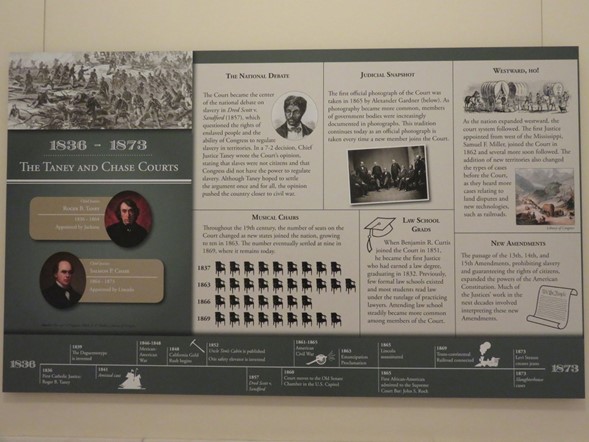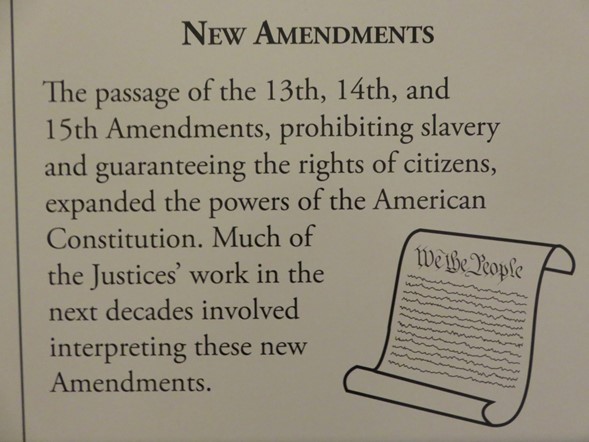2023年1月2日
著者:小野 康英(米国特許弁護士)
1970年前半まで、州は、米国人以外の者(日本人を含む)(以下、「外国人」)による弁護士資格の取得を拒否することができ、実際に、そのような州が存在していた。
その状況を一転させ、外国人による米国弁護士資格取得が米国憲法上保証されることを明確にしたのがGriffiths事件(1973年)である。同事件では、Connecticut州の司法試験の受験適格を外国人に認めないとする州の規制の米国憲法適合性、具体的には米国憲法第14修正(Fourteenth Amendment to the United States Constitution)に規定される平等保護条項への適合性が争点となった。
今回は、まず、Griffiths事件の理解の前提となる米国憲法第14修正の概要を、米国の歴史の中で重要な事件を適宜交えつつ紹介する。その上で、次回に、この米国憲法第14修正の知識を前提として、Griffiths事件を紹介する。
目次
米国憲法第14修正
Ⅰ.米国憲法第14修正の概要
米国憲法第14修正は、南北戦争(American Civil War)(1861年-1865年)で北部州(非奴隷州)が勝利した後の1868年7月9日に採択された。同修正は様々な事項を規定するが、特に、「市民権条項」、「特権又は免責特権条項」、「適正手続条項」及び「平等保護条項」を規定する第1項が重要である。
|
The Fourteenth Amendment to the United States Constitution, Section 1 【参考訳】 |
Ⅱ.市民権条項(Citizenship Clause)
市民権条項は、Dred Scott事件(1857年)を立法的に覆し、及び、米国人の意義を明確にする趣旨で新設された(注1)。同条項により、両親がいずれも米国人でなくても、米国で生まれた子供は米国人となる。
|
(注1) 米国最高裁判所は、Slaughter-House事件において、その趣旨を次のとおり説明する。 The Slaughter-House Cases, 83 U.S. (16 Wall.) 36 (1873) To remove this difficulty primarily, and to establish a clear and comprehensive definition of citizenship which should declare what should constitute citizenship of the United States, and also citizenship of a State, the first clause of the first section was framed." |
Dred Scott事件の概要は次のとおりである(注2)。
|
(注2) 米国最高裁判所には、Dred Scott事件の概要を説明するパネルが展示されている。筆者がそこで撮影したパネルの写真を以下に示す。 |
|
|
|
|
|
|
|
|
|
1820年に制定されたMissouri互譲法(Missouri Compromise Act)は、ルイジアナ購入(Louisiana Purchase)によりフランスから取得した地域に州を創設する場合、北緯36度30分以北を自由州(非奴隷州)とし、及び、同以南を奴隷州とする旨規定していた("That in all that territory ceded by France to the United States, which lies north of thirty-six degrees thirty minutes north latitude, slavery and involuntary servitude shall be, and are hereby, forever prohibited.")。同法は、非奴隷州及び奴隷州の均衡を保つために制定された、文字どおり互譲の産物であった。
Dred Scottは、Missouri州(奴隷州)在住のEmerson医師(軍医)が所有する黒人奴隷(negro slave)であった。Scottは、1834年以降、Emerson医師の転勤に伴い、米国各所を転々とした。Scottは、Emerson医師がMissouri州に戻りそこで死去した後、奴隷として、Emerson医師の妻に相続された。Scottは、Emerson医師の転勤に伴いIllinois州(自由州)及びWisconsin領土(奴隷禁止地域)で暮らした時点で、ミズーリ互譲法に基づき、自由の身になっていたと主張し、Emerson医師の妻に対して、非奴隷の地位確認及び損害賠償を求めた。
米国最高裁判所は、7対2で、Missouri互譲法は米国憲法違反で無効、アフリカから奴隷として連れてこられた人間及びその子孫(以下「アフリカ系米国人」)は米国民ではなく奴隷(人権のない動産)であって訴権を有さない、及び、Scottは奴隷の地位にとどまる、と判示した。
|
Dred Scott v. Sandford, 60 U.S. (19 How.) 393 (1857) "Scott and his family upon their return were not free, but were, by the laws of Missouri, the property of the defendant[.]" "[T]he Circuit Court of the United States had no jurisdiction, when, by the laws of the State, the plaintiff was a slave, and not a citizen." "Its judgment for the defendant must, consequently, be reversed, and a mandate issued, directing the suit to be dismissed for want of jurisdiction." (emphasis added) |
Dred Scott事件後、北部州(非奴隷州)及び南部州(奴隷州)の対立がさらに厳しくなった。そして、1860年末に奴隷反対派のエイブラハム・リンカーン(Abraham Lincoln)が大統領選挙に勝利したことで、両者の対立は頂点に達し、1861年2月、複数奴隷州が、米国(USA: United States of America)からの脱退及びアメリカ連合国(CSA: Confederate States of America)の設立を一方的に宣言した。そして、同年4月、CSA軍がSouth Carolina州のSumter要塞(Fort Sumter)に駐留していたUSA軍に攻撃をしたことをきっかけに、南北戦争(米国の内戦)が始まった。上記のとおり、南北戦争は、北部州(非奴隷州)の勝利に終わり、1868年7月9日に米国憲法第14修正が採択された。これにより、同じく上記のとおり、Dred Scott事件は立法的に覆され、アフリカ系米国人の米国民としての地位が米国憲法上確立した。
Ⅲ.特権又は免責特権条項(Privileges or Immunities Clause)
特権又は免責特権条項は、各州は、米国民の特権又は免責特権を縮減する法を制定し又は施行してはならない旨を規定する。
米国最高裁判所は、米国憲法第14修正の採択から5年後のSlaughter-House事件(1873年)において、特権又は免責特権条項の「米国民の特権又は免責特権(the privileges or immunities of citizens of the United States)」の意義を初めて解釈した。その解釈は、現在も有効な判例である。
Slaughter-House事件の概要は次のとおりである。
Louisiana州議会は、特定の会社(Crescent City Stock Landing and Slaughter-House Company)を設立し、その会社に対して、25年間、New Orleans市を含む一定の区域内における食用家畜の荷揚げ、飼育及び屠殺、並びにこれらの業務の施設設立についての独占権を付与する旨の州法を制定した("An act to protect the health of the City of New Orleans, to locate the stock landings and slaughter-houses, and to incorporate ‘The Crescent City Live-Stock Landing and Slaughter-House Company’")。この州法により関連業務を著しく制限されることになる地元の食肉解体業者団体(The Butchers' Benevolent Association of New Orleans)は、Louisiana州法の無効(違憲)を求める訴訟を提起した。
米国最高裁判所は、5対4で、Louisiana州法を有効(合憲)と判断した。
まず、米国最高裁判所は、Louisiana州議会による問題の州法の制定は、米国憲法の人権規定に反しない限り、米国憲法第10修正が州に認める福祉権能(police power)(注3)の範囲内と判示した。
|
The Slaughter-House Cases, 83 U.S. (16 Wall.) 36 (1873) It can readily be seen that the interested vigilance of the corporation created by the Louisiana legislature will be more efficient in enforcing the limitation prescribed for the stock-landing and slaughtering business for the good of the city than the ordinary efforts of the officers of the law. ... It may[] be considered as established, that the authority of the legislature of Louisiana to pass the present statute is ample, unless some restraint in the exercise of that power be found in the constitution of that State or in the amendments to the Constitution of the United States[.]" (emphasis added) |
| (注3) 米国憲法第10修正の条文及び「英米法辞典」の解説を以下に引用しておく。同修正は、州の行為が正当である場合の根拠として、判例においてしばしば引用される。
-------------------------------------------------------------------------------------- 10th Amendment to the United States Constitution 【参考訳】 田中英夫(編)「英米法辞典」東京大学出版会(1991年) ▲「警察権能」 という訳については, 日本語の 「警察」 が, 公共の福祉全般を示す police と比べるとその意味がかなりの程度において限定されていることに注意。」 |
次に、米国最高裁判所は、特権又は免責特権条項の射程は、州民の立場で認められる特権又は免除とは明確に区別された、「米国人の立場で認められる特権又は免除(the privileges or immunities of citizens of the United States)」に限定されると解釈し、原告(地元の食肉解体業者団体)の権利は同条項の保護の範囲外にあると判示し、結論として、原告の請求を棄却した。
|
The Slaughter-House Cases, 83 U.S. (16 Wall.) 36 (1873) Of the privileges and immunities of the citizen of the United States, and of the privileges and immunities of the citizen of the State, and what they respectively are, we will presently consider; but we wish to state here that it is only the former which are placed by this clause under the protection of the Federal Constitution, and that the latter, whatever they may be, are not intended to have any additional protection by this paragraph of the amendment. If, then, there is a difference between the privileges and immunities belonging to a citizen of the United States as such, and those belonging to the citizen of the State as such the latter must rest for their security and protection where they have heretofore rested; for they are not embraced by this paragraph of the amendment. ... "[W]e are of opinion that the rights claimed by these plaintiffs in error, if they have any existence, are not privileges and immunities of citizens of the United States within the meaning of the clause of the fourteenth amendment under consideration." (emphasis added) |
米国最高裁判所の解釈によれば、州が米国憲法第10修正の福祉権能に基づき行うことが許される規制は、全て、特権又は免責特権条項の射程外ということになる。米国最高裁判所は、Slaughter-House事件により、特権又は免責特権条項を実質的に骨抜きにしたと考えられる(注4)。
|
(注4) 米国最高裁判所が、Slaughter-House事件において、傍論(obiter dictum)として、特権又は免責特権条項が適用されると判示した場面を以下に紹介する。 The Slaughter-House Cases, 83 U.S. (16 Wall.) 36 (1873) One of these is [] the right of the citizen of this great country, protected by implied guarantees of its Constitution, ‘to come to the seat of government to assert any claim he may have upon that government, to transact any business he may have with it, to seek its protection, to share its offices, to engage in administering its functions. He has the right of free access to its seaports, through which all operations of foreign commerce are conducted, to the subtreasuries, land offices, and courts of justice in the several States.’ ... Another privilege of a citizen of the United States is to demand the care and protection of the Federal government over his life, liberty, and property when on the high seas or within the jurisdiction of a foreign government. Of this there can be no doubt, nor that the right depends upon his character as a citizen of the United States. The right to peaceably assemble and petition for redress of grievances, the privilege of the writ of habeas corpus, are rights of the citizen guaranteed by the Federal Constitution. The right to use the navigable waters of the United States, however they may penetrate the territory of the several States, all rights secured to our citizens by treaties with foreign nations, are dependent upon citizenship of the United States, and not citizenship of a State. One of these privileges is conferred by the very article under consideration." (emphasis added) |
なお、Slaughter-House事件の直後のBradwell事件では、司法試験の申請人の性別が女性であることを理由に司法試験の受験適格を否定したIllinois州最高裁判所の処分の合憲性が争われた。受験適格を否定されたBradwellは、Illinois州最高裁判所の処分は、特権又は免責特権条項に違反すると主張したが、米国最高裁判所は、Slaughter-House事件を引用した上で、同条項は、州政府が管轄する弁護士資格には適用されないとして、Illinois州最高裁判所の処分を合憲とした。
|
Bradwell v. Illinois, 83 U.S. 130 (1873) "We agree with [counsel for Bradwell] that there are privileges and immunities belonging to citizens of the United States, in that relation and character, and that it is these and these alone which a state is forbidden to abridge. But the right to admission to practice in the courts of a state is not one of them. This right in no sense depends on citizenship of the United States. It has not, as far as we know, ever been made in any state, or in any case, to depend on citizenship at all. Certainly many prominent and distinguished lawyers have been admitted to practice, both in the state and federal courts, who were not citizens of the United States or of any state. ... The opinion just delivered in the Slaughter-House Cases[] renders elaborate argument in the present case unnecessary, for, unless we are wholly and radically mistaken in the principles on which those cases are decided, the right to control and regulate the granting of license to practice law in the courts of a state is one of those powers which are not transferred for its protection to the federal government, and its exercise is in no manner governed or controlled by citizenship of the United States in the party seeking such license. It is unnecessary to repeat the argument on which the judgment in those cases is founded. It is sufficient to say they are conclusive of the present case." (emphasis added) |
現在一般的に形成されている価値判断に照らした場合、性別が女性であることを理由に司法試験の受験適格を否定することは社会的に容認しがたいものと筆者は考える。一方で、米国政府ではなく州政府が管轄する司法試験の受験適格の存否を特権又は免責特権条項に基づき争えば、Slaughter-House事件が有効な判例であることを前提とする限り、この結論はやむを得ないと思われる。なお、筆者が法廷意見を読んだ限りでは、Bradwell事件において、Bradwellは、平等保護条項違反を主張していなかったようである。
Ⅳ.適正手続条項(Due Process Clause)
適正手続条項は、生命、自由及び財産(life, liberty, or property)に関する州政府の規制の正当性を審査する際に用いられる。適正手続条項の遵守義務の主体は州政府である。
適正手続条項は、それ自体、実体法を構成すると共に、米国憲法中の人権規定-いわゆる権利章典(Bill of Rights)(米国憲法第1修正から第10修正まで)について、適正手続条項に取込み(Incorporation of the Bill of Rights)(注5)を行うことで、権利章典を州政府に遵守させるための根拠ともなっている。このため、米国憲法第14修正第1項の適正手続条項は重要な条項となっている。
|
(注5)米国最高裁判所は、適正手続条項を通じて、本来は米国政府が遵守義務負う権利章典の順守を州政府に求めている。たとえば、米国憲法第5修正の収用条項(Taking Clause)([private property shall not] be taken for public use, without just compensation.)は、本来は、米国政府が遵守義務負う権利章典であるが、米国最高裁判所は、適正手続条項を通じて、その遵守を州政府にも求めた。 Chicago, Burlington & Quincy Railroad Co. v. City of Chicago, 166 U.S. 226 (1897) |
たとえば、米国最高裁判所は、従来、結婚は米国憲法第10修正の福祉権能に基づき州が管轄するとの理解に基づき、同性婚の問題の審理自体を拒否していた(注6)。しかし、2015年のObergefell事件において、Baker事件を判例変更した上で、同性婚を禁止する州政府の規制は適正手続条項(及び平等保護条項)に違反すると判示した。
|
Obergefell v. Hodges, 576 U.S. 644 (2015) pp. 675-676 |
|
(注6)Baker v. Nelson, 409 U.S. 810 (1972) ("Appeal from Sup. Ct. Minn, dismissed for want of substantial federal question.") |
なお、生命、自由及び財産に関する米国政府の規制の正当性は、米国憲法第5修正(Fifth Amendment)に規定される適正手続条項(Due Process Clause)に基づき審査される。
Ⅴ.平等保護条項(Equal Protection Clause)
平等保護条項は、アフリカ系米国人の明示の差別を認める州法を禁止する趣旨で制定され、一般的に、人種、性別、国籍等の区分(classification)に基づき、特定の人に対して異なる取り扱いをする州法の正当性を審査する際に用いられる。平等保護条項の遵守義務の主体は州政府である。
米国最高裁判所は、米国憲法第14修正の採択から約30年後のPlessy事件(1896年)において、Louisiana州内を運行する鉄道内で、白人(the white)及び有色人種(colored races)の客席を分離することを強制したLouisiana州法は、平等保護条項に照らして合憲と判断した(注7)。
|
(注7) Plessy事件に関係する鉄道の車両の一例を、Maryland州Baltimoreに所在するBaltimore & Ohio (B&O) Railroad Museumにて見ることができる。筆者がそこで撮影した展示物の写真を以下に示す。 |
|
|
|
|
|
|
|
|
|
|
|
また、Dred Scott事件と同様、米国最高裁判所には、Plessy事件の概要を説明するパネルが展示されている。筆者がそこで撮影したパネルの写真を以下に示す。 |
|
|
|
Plessy事件の概要は次のとおりである。
Louisiana州議会は、1890年、州内を運行する鉄道において、白人及び有色人種の客席を分離する(各人種用の客車を用意する、又は、一の客車内をパーティションで分離して各人種用の客席を用意する)ことを強制する州法を制定した。
Plessyは、彼が指定された有色人種用の客席に座ることを拒否して、白人用の客席に座ることを主張したため、客車から強制的に排除され、警察に連行され、上記州違反を理由に、Louisiana州裁判所にて刑事訴追された。Plessyは、Louisiana州最高裁判所が禁止令状(writ of prohibition)(注8)の発行を拒否したため、米国最高裁判所に対して誤審令状(writ of error)(注9)の発行を求めた。
|
(注8)田中英夫(編)「英米法辞典」東京大学出版会(1991年) (注9)田中英夫(編)「英米法辞典」東京大学出版会(1991年) |
米国最高裁判所は、7対1で、Louisiana州法を平等保護条項に照らして合憲と判断した。そこで確立された法理が、平等保護条項から導かれる、いわゆる「分離すれども平等の法理(Separate-But-Equal Doctrine)」である(注10)。
|
Plessy v. Ferguson, 163 U.S. 537 (1896) "We consider the underlying fallacy of the plaintiff’s argument to consist in the assumption that the enforced separation of the two races stamps the colored race with a badge of inferiority. If this be so, it is not by reason of anything found in the act, but solely because the colored race chooses to put that construction upon it." (emphasis added) |
|
(注10)法廷意見の中では「分離すれども平等の(separate but equal)」という用語は用いられていない。一方、Harlan判事の反対意見は、争点となったLouisiana州法における"equal but separate accommodations for the white, and colored races"との規定を"separate but equal accommodations for white and colored persons"と言い換えて引用した。現在、Plessy事件を引用する際に一般的に使用されている「分離すれども平等の(separate but equal)」は、このHarlan判事の反対意見の一節に由来すると筆者は推察する。 |
この分離すれども平等の法理はその後約半世紀にわたって米国を支配し、複数の州政府は、平等保護条項の下で、人種分離政策を公然と実行していた。同法理が廃止されたのは、Brown I事件(1954年)においてであった(注11)。
|
(注11) Brown事件の原告であったLinda Brown氏は2018年3月に死去した。その直後、この事実をBrown事件と関連付けて伝える記事が多数発信された。事件当時は一私人に過ぎなかった故Brown氏は、Brown事件により、米国憲法史のみならず、米国史にその名を刻むこととなったと考えられる。 https://www.cnn.com/2018/03/26/us/linda-brown-dies/index.html |
米国最高裁判所は、Brown I事件において、全員一致で、Plessy事件の分離すれども平等の法理を廃止した上で、白人及び有色人種についてそれぞれ別の公立学校の設立を強制する複数の州法は平等保護条項に違反すると判示した。その際、米国最高裁判所は、人種分離政策が、特に、アフリカ系米国人の生徒への悪影響を及ぼすという政策論に基づき、結論を導いた。これは、通常、多数の先例に基づき法理論を構築する米国最高裁判所としては異例と思われる。
|
Brown v. Board of Education of Topeka, 347 U.S. 483 (1954) Whatever may have been the extent of psychological knowledge at the time of Plessy v. Ferguson, this finding is amply supported by modern authority.[] Any language in Plessy v. Ferguson contrary to this finding is rejected. We conclude that in the field of public education the doctrine of ‘separate but equal’ has no place. Separate educational facilities are inherently unequal. Therefore, we hold that the plaintiffs and others similarly situated for whom the actions have been brought are, by reason of the segregation complained of, deprived of the equal protection of the laws guaranteed by the Fourteenth Amendment." (emphasis added) |
以上のとおり、私見では、米国最高裁判所は、米国憲法第14修正第1項の解釈を通じて、南北戦争以降の米国における人権のあり方の枠組みを決めてきたと言っても過言ではない。
なお、米国憲法第5修正は、次のとおり規定する。
|
The Fifth Amendment to the United States Constitution |
これによれば、米国憲法第5修正も、米国憲法第14修正と同様に、適正手続条項を規定している。両者の違いは、前者の遵守義務の主体が州政府であるのに対して、後者の遵守義務の主体が連邦政府である点である。ここで、米国憲法第14修正は平等保護条項を規定するのに対して、米国憲法第5修正は同条項を規定していないので、その反対解釈として、連邦政府は、平等保護条項の遵守義務を負わないと解する余地がある。この点、米国最高裁判所は、Brown I事件と同日付で判決されたBolling事件(1954年)において、適正手続条項及び平等保護条項は常に置き換えが可能な概念という訳ではないが、連邦政府(コロンビア特別区を含む)が行う差別については、適正手続条項に基づいて規制し得ると判示した。
|
Bolling v. Sharpe, 347 U.S. 497, 498-499 (1954) |
この考え方は、州政府に対して適用される米国憲法第14修正の平等保護条項を、米国憲法第5修正の適正手続条項を通じて連邦政府に適用する法理で、逆組込み(reverse incorporation)とよばれる。なお、組込み(incorporation)とは、米国憲法第14修正の適正手続条項を通じて米国憲法第1修正から第10修正の権利章典を選択的に州政府の行為の規制に適用する法理を指す。
Ⅵ.【付言】州際通商条項(Interstate Commerce Clause)
Griffiths事件(1973年)の理解の前提としての米国憲法第14修正第1項の理解は以上で十分と思われる。付言すると、米国における人種差別の問題は米国憲法第14修正第1項で全て解決できるわけではない。なぜなら、平等保護条項は、文理上、州による差別を規制できるが("No state shall ... deny ... the equal protection of the laws")、私人による差別を規制することはできないからである。たとえば、あるレストラン(私人)が、特定の人種の人間の入店を断ることは、平等保護条項では規制できない。
この点、私人間の人種差別を制定法で解決する(州議会ではなく、)米国議会の試みはBrown I事件(1954年)より前から行われてきた。しかし、米国最高裁判所は、そのような制定法をことごとく無効としてきた。一例として、米国憲法第14修正が採択されてから初めて制定された1875年公民権法(Civil Rights Act of 1875)を米国最高裁判所が無効と判断した経緯を説明したPlessy事件の一節を以下に紹介する。
|
Plessy v. Ferguson, 163 U.S. 537 (1896) |
その潮目はBrown I事件(1954年)&Brown II事件(1955年)からほどなくして変わった。具体的には、John F. Kennedy大統領暗殺(1963年)後、米国議会は、私人間の人種差別の禁止を旨とする1964年公民権法(Civil Rights Act of 1964)を再び制定した。ところが、Georgia州Atlanta 所在のとあるホテルのオーナは、公民権法を公然と無視して、アフリカ系米国人に部屋を提供することを拒否していた。そして、同オーナが、米国政府を被告として、公民権法の無効(憲法違反)を求めたHeart of Atlanta Motel事件において、米国最高裁判所は、同法(連邦法)は、米国憲法第1章第8条第3項の州際通商条項(Interstate Commerce Clause)を根拠として合憲と判断した。
|
U.S. Constitution, Article 1, Section 8, Clause 3 【参考訳】 Heart of Atlanta Motel v. United States, 379 U.S. 241 (1964) "[T]he power of Congress to promote interstate commerce also includes the power to regulate the local incidents thereof, including local activities in both the States of origin and destination, which might have a substantial and harmful effect upon that commerce." "We[] conclude that the action of the Congress in the adoption of the Act as applied here to a motel which concededly serves interstate travelers is within the power granted it by the Commerce Clause of the Constitution, as interpreted by this Court for 140 years. It may be argued that Congress could have pursued other methods to eliminate the obstructions it found in interstate commerce caused by racial discrimination. But this is a matter of policy that rests entirely with the Congress not with the courts. How obstructions in commerce may be removed—what means are to be employed—is within the sound and exclusive discretion of the Congress. It is subject only to one caveat—that the means chosen by it must be reasonably adapted to the end permitted by the Constitution. We cannot say that its choice here was not so adapted. The Constitution requires no more." (emphasis added) |
アフリカ系米国人の奴隷解放及び差別撤廃を目的に新設された平等保護条項が解決できない問題を、米国建国当時から存在する州際通商条項が解決するという法理論を立法者が想定したとは筆者には思えない。しかし、これが現行の憲法解釈であり、また、その結論は妥当と筆者は考える。
人種差別を巡る問題は今日もまだ続いているとみる余地もあるが、いずれにしても、現行の憲法解釈の下での人種差別を規制する論理の大枠は、以上の判例及び制定法により定まったと考えられる(注12)。
|
(注12)真摯な信条に基づく私人間の差別については、米国憲法第1修正の自由な宗教活動条項(Free Exercise Clause)が関わるため、話しが複雑になる。 The First Amendment to the United States Constitution 【参考訳】 たとえば、Masterpiece Cakeshop事件(2018年)では、敬けんなクリスチャンであるPhillips氏が、性的指向を理由に、同氏の信条に反するメッセージを添えた、同性婚を行うカップルのためのケーキの製作を拒否したことが、性的指向及び信条を含む特徴に基づく、特定個人に対する商品又は役務の提供の拒否を禁止するColorado Anti-Discrimination Act (CADA)に違反するかどうかが争点となった。なお、この出来事が起きた当時、Colorado州は同性婚を認めていなかった。Colorado州内の行政及び裁判手続では、Phillips氏はCADAに違反すると判断された。これに対して、米国最高裁判所は、Colorado州の判断は、(米国憲法第14修正の適正手続条項を介して州政府に適用される)米国憲法第1修正の自由な宗教活動条項に違反すると判示した。本事件では、結果として、Colorado州の行為が自由な宗教活動条項に違反することを根拠に、私人間の差別が認められたことになる。 Masterpiece Cakeshop v. Co. Civil Rights Comm’n, 584 U.S. ____ (2018) The freedoms asserted here are both the freedom of speech and the free exercise of religion. The free speech aspect of this case is difficult, for few persons who have seen a beautiful wedding cake might have thought of its creation as an exercise of protected speech. This is an instructive example, however, of the proposition that the application of constitutional freedoms in new contexts can deepen our understanding of their meaning. ... Whatever the confluence of speech and free exercise principles might be in some cases, the Colorado Civil Rights Commission’s consideration of this case was inconsistent with the State’s obligation of religious neutrality. The reason and motive for the baker’s refusal were based on his sincere religious beliefs and convictions. The Court’s precedents make clear that the baker, in his capacity as the owner of a business serving the public, might have his right to the free exercise of religion limited by generally applicable laws. Still, the delicate question of when the free exercise of his religion must yield to an otherwise valid exercise of state power needed to be determined in an adjudication in which religious hostility on the part of the State itself would not be a factor in the balance the State sought to reach. That requirement, however, was not met here. When the Colorado Civil Rights Commission considered this case, it did not do so with the religious neutrality that the Constitution requires. Given all these considerations, it is proper to hold that whatever the outcome of some future controversy involving facts similar to these, the Commission’s actions here violated the Free Exercise Clause; and its order must be set aside." (emphasis added) Masterpiece Cakeshop v. Co. Civil Rights Comm’n, 584 U.S. ____ (2018) , concurring opinion by Justice Gorsuch. Masterpiece Cakeshop v. Co. Civil Rights Comm’n, 584 U.S. ____ (2018) , concurring-in-part-and-concurring-in-the-judgment opinion by Justice Thomas. |
以上の米国憲法の判例に接して筆者が思うことは、特に、曖昧に又は広く規定されている法令は、解釈者の価値判断により、いかようにでも解釈し得、それにより、結論はいかようにでもなり得るということである。日々の特許実務においても、この点について心しておく必要があると筆者は考える。
次回は、以上の米国憲法第14修正の知識を前提として、Griffiths事件を紹介する。
| Previous<<第18回:資格~弁護士資格及び特許弁理士資格の抵触-Sperry事件(1963年)~(2022年12月29日) | Next>>第20回:判例~外国人及び弁護士資格(その2)―Griffiths事件(1973年)~(2023年1月10日) |











